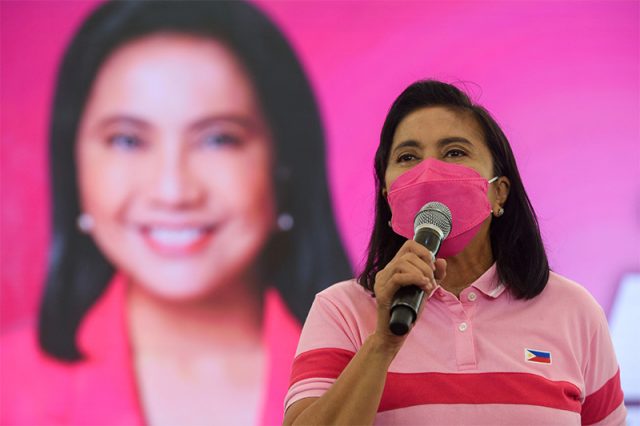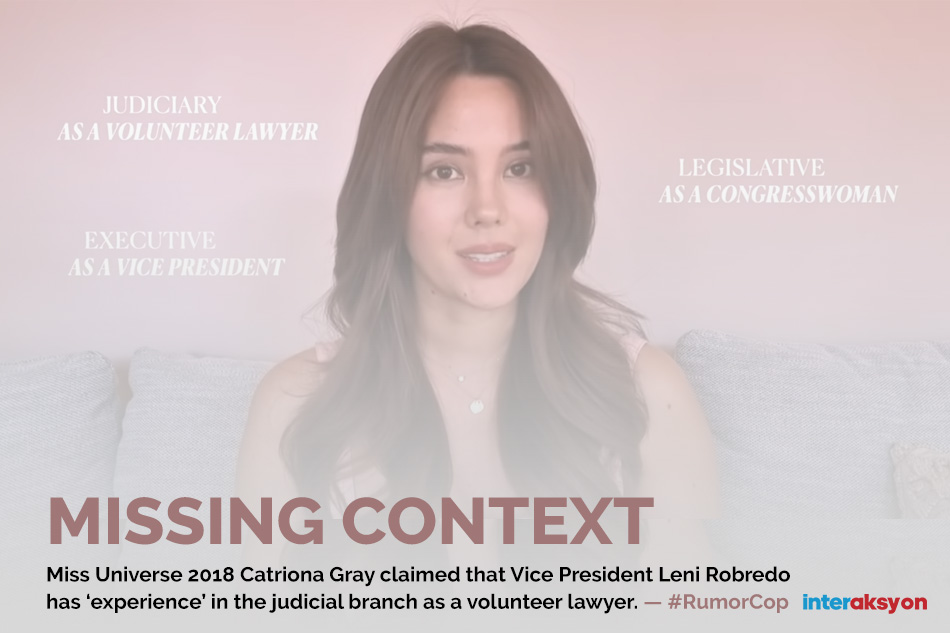
Claim
Miss Universe 2018 Catriona Gray‘s comment on her voter awareness vlog released Monday about a presidential bet having experience in “all three branches of the government” sparked a debate in the online community.
Some Facebook users argued that the former beauty queen was wrong in claiming Vice President Leni Robredo has experience in the government’s judicial branch, which Catriona called the “judiciary” in short.
The former Miss Universe titleholder mentioned it in explaining her criteria for choosing the country’s next leader, namely the qualifications of work history, sense of service, platform and values.
“And my choice for president is Leni Robredo. She is the only candidate with the experience in all three branches of the government: Judiciary as a volunteer lawyer, legislative as a congresswoman and executive as a vice president,” she added.
READ: Gray to pink: Catriona Gray bares her May 9 bets in voting awareness vlog
Robredo rendered legal services to the Public Attorney’s Office (PAO) in Naga City from 1997 to 1999.
Meanwhile, a Facebook user who took a screenshot of Catriona’s video said that PAO “falls under the executive, not judiciary.”
PAO is an independent and autonomous office attached to the Department of Justice, which is under the executive branch of the government but is part of the judicial system.
Rating

Catriona Gray’s claim on Robredo’s “judiciary” experience as a “volunteer lawyer” under PAO has missing context.
It would be more accurate for her to say that Robredo has exposure to the three branches of government while not technically serving, or having experience, within the judiciary.
Context
Catriona referred to the judicial branch as “judiciary.” The generalized term can refer to either the government’s third branch or the entire legal system involving courts, judges and officers encompassing, theoretically, all lawyers.
The Supreme Court in a 2019 ruling referred to all lawyers as “officers of the court.”
“They are called upon to assist in the administration of justice. They act as vanguards of our legal system to protect and uphold truth and the rule of law. They are expected to act with honesty in all their dealings, especially with the court,” it said on the Genato versus Atty. Mallari case.
Election lawyer Emil Marañon III explained that lawyers, as officers of the court, are “tasked to participate to the best of their ability in the functioning of the judicial system to forge justice, pursue the legitimate interests of all parties and the general good of society.”
Marañon argued on Twitter that such is the reason why a lawyer’s license to practice is issued by the judiciary, and not by the Professional Regulation Commission which is under the executive branch of government.
PRC is the agency mandated to regulate the practice of professionals constituting the highly skilled manpower of the country such as nurses, architects and chemists, among others.
The Bar examinations taken by aspiring lawyers, moreover, are exclusively administered by the Supreme Court—which is part of the judiciary branch of the government.
The 1987 Philippine Constitution states that the judicial power of the government “rests with the Supreme Court and the lower courts.”
Caveat: While Robredo may have exposure to the judiciary as a public attorney, she has not been part of the courts holding constitutional powers granted to the judiciary.
Sec. 1 Article VIII of the Constitution states, “Judicial power includes the duty of the courts of justice to settle actual controversies involving rights which are legally demandable and enforceable, and to determine whether or not there has been a grave abuse of discretion amounting to lack or excess of jurisdiction on the part of any branch or instrumentality of the Government.”









